The Chief of Staff role is about supporting and enabling the success of the executive team. They act as a trusted advisor, ensuring that strategic initiatives are executed effectively and that communication flows smoothly within the organization.
Skills required for a Chief of Staff include strategic thinking, project management, and strong interpersonal abilities. Assessing these skills involves evaluating past experiences, problem-solving capabilities, and the ability to manage complex projects.
Candidates can write these abilities in their resumes, but you can’t verify them without on-the-job Chief Of Staff skill tests.
In this post, we will explore 9 essential Chief Of Staff skills, 11 secondary skills and how to assess them so you can make informed hiring decisions.
Table of contents
9 fundamental Chief Of Staff skills and traits
The best skills for Chief Of Staffs include Strategic Planning, Project Management, Data Analysis, Communication, Problem Solving, Time Management, Financial Acumen, Stakeholder Management and Organizational Skills.
Let’s dive into the details by examining the 9 essential skills of a Chief Of Staff.
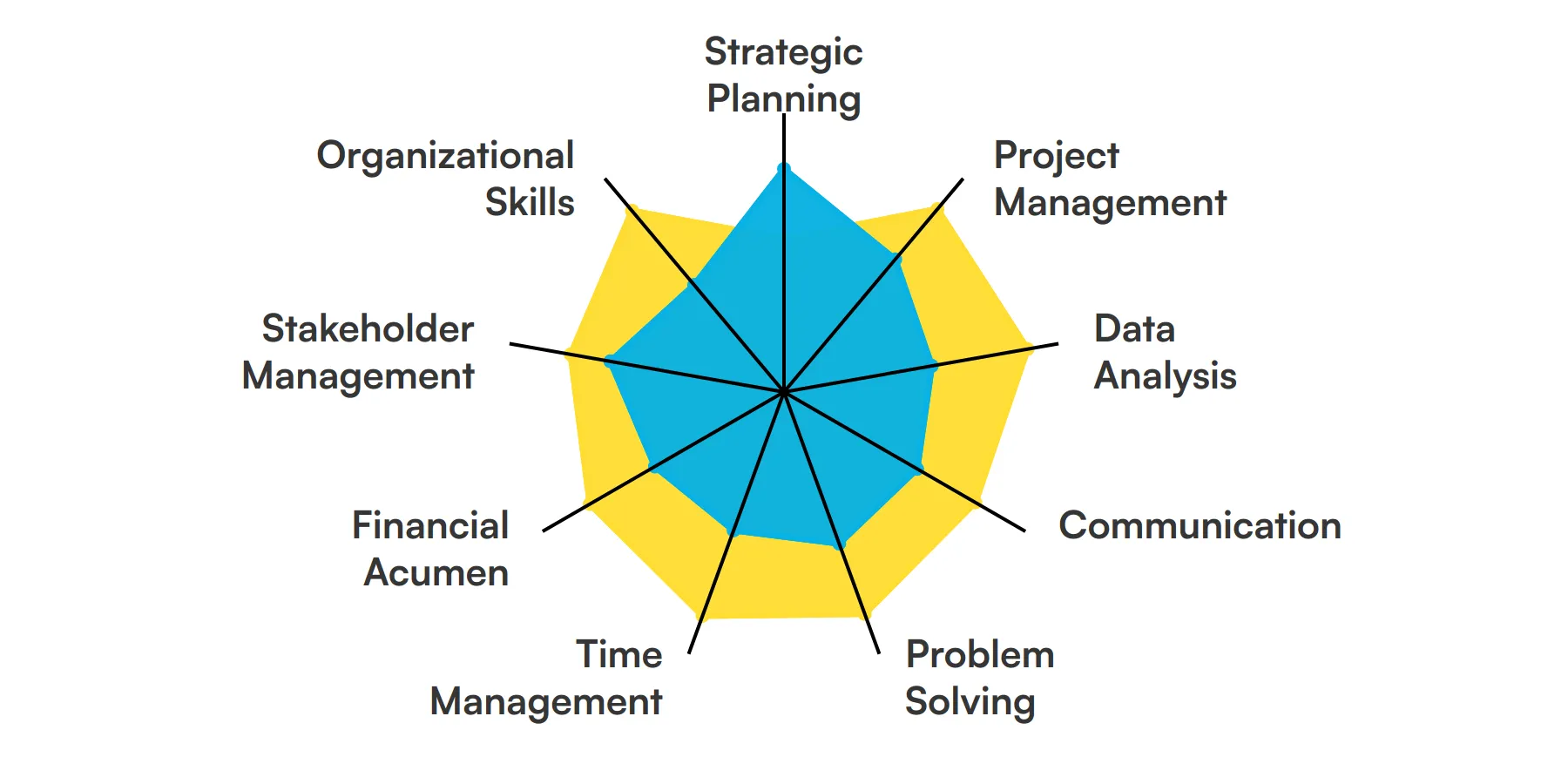
Strategic Planning
Strategic planning is about setting long-term goals and determining the best approach to achieve them. A Chief of Staff uses this skill to align the team’s efforts with the company’s vision, ensuring that all initiatives are moving in the right direction.
For more insights, check out our guide to writing a Chief Of Staff Job Description.
Project Management
Project management involves planning, executing, and closing projects. In the role of Chief of Staff, this skill is crucial for overseeing multiple projects simultaneously, ensuring they are completed on time and within budget.
Data Analysis
Data analysis is the process of inspecting, cleansing, and modeling data to discover useful information. A Chief of Staff leverages this skill to make informed decisions, identify trends, and provide actionable insights to the executive team.
Check out our guide for a comprehensive list of interview questions.
Communication
Effective communication is key to conveying ideas clearly and ensuring everyone is on the same page. The Chief of Staff must excel in both written and verbal communication to facilitate smooth interactions between departments and stakeholders.
Problem Solving
Problem solving involves identifying issues and developing solutions. A Chief of Staff uses this skill to address challenges that arise, ensuring that obstacles do not derail the organization’s progress.
Time Management
Time management is about prioritizing tasks and managing time effectively. In the role of Chief of Staff, this skill is essential for juggling various responsibilities and ensuring that critical tasks are completed promptly.
Financial Acumen
Financial acumen involves understanding financial statements and managing budgets. A Chief of Staff needs this skill to oversee financial planning and ensure that the organization’s resources are being used efficiently.
For more insights, check out our guide to writing a Financial Analyst Job Description.
Stakeholder Management
Stakeholder management is about identifying and engaging with key stakeholders. The Chief of Staff uses this skill to build strong relationships and ensure that the interests of all parties are considered in decision-making processes.
Organizational Skills
Organizational skills involve structuring tasks and resources effectively. A Chief of Staff must be highly organized to manage the executive’s schedule, coordinate meetings, and keep track of various projects and initiatives.
11 secondary Chief Of Staff skills and traits
The best skills for Chief Of Staffs include Conflict Resolution, Negotiation, Adaptability, Tech Savvy, Research Skills, Event Planning, Risk Management, Networking, Presentation Skills, Crisis Management and Customer Focus.
Let’s dive into the details by examining the 11 secondary skills of a Chief Of Staff.
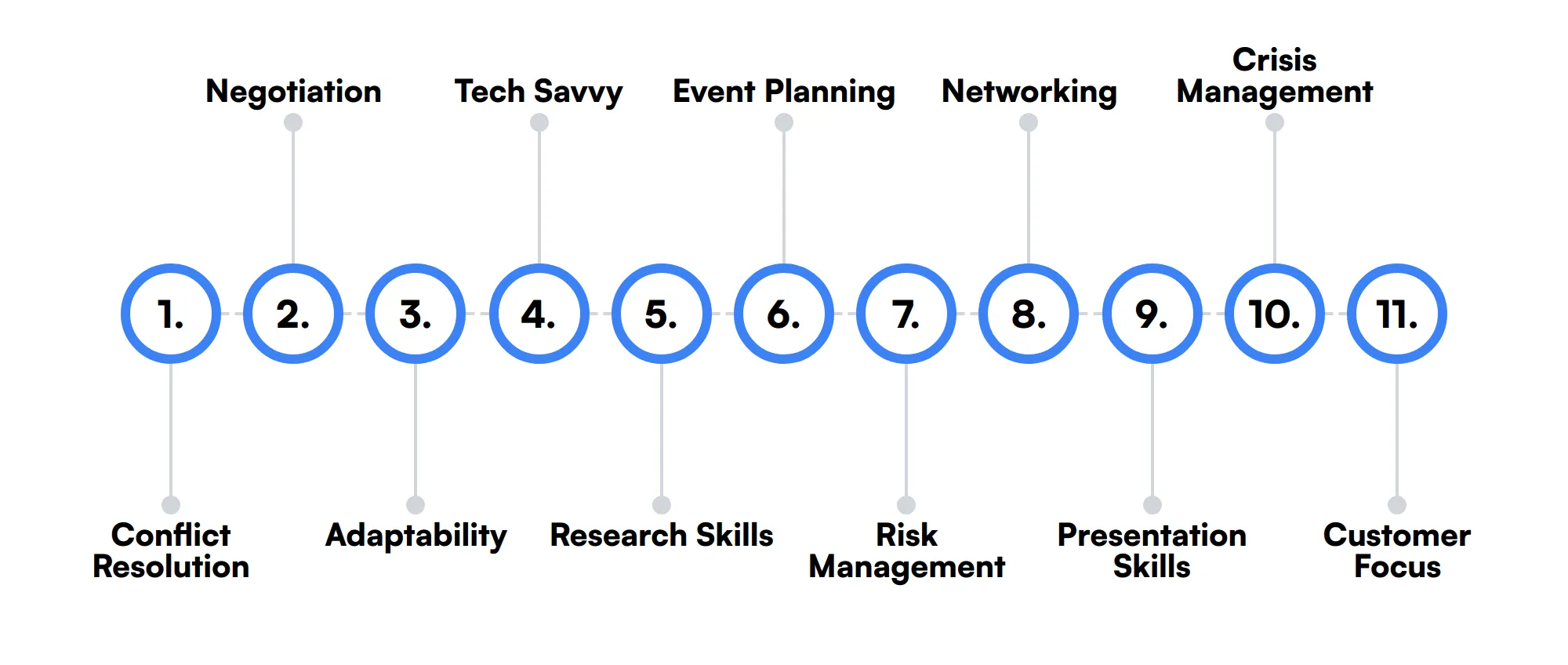
Conflict Resolution
Conflict resolution is the ability to mediate disputes and find mutually acceptable solutions. This skill helps the Chief of Staff maintain a harmonious work environment and resolve any issues that may arise among team members.
Negotiation
Negotiation involves reaching agreements through discussion and compromise. A Chief of Staff often uses this skill to secure resources, manage vendor relationships, and align team objectives.
Adaptability
Adaptability is the ability to adjust to new conditions and changes. The Chief of Staff must be flexible and open to change, as the role often involves dealing with unexpected challenges and shifting priorities.
Tech Savvy
Being tech savvy means having a good understanding of modern technology and tools. A Chief of Staff benefits from this skill by leveraging software and digital tools to streamline processes and improve efficiency.
Research Skills
Research skills involve gathering, analyzing, and interpreting information. The Chief of Staff uses this skill to stay informed about industry trends, competitor activities, and best practices.
Event Planning
Event planning is the process of organizing and coordinating events. A Chief of Staff may use this skill to plan company meetings, retreats, and other important gatherings.
Risk Management
Risk management involves identifying, assessing, and mitigating risks. The Chief of Staff uses this skill to foresee potential issues and develop strategies to minimize their impact on the organization.
Networking
Networking is the ability to build and maintain professional relationships. A Chief of Staff uses this skill to connect with industry peers, potential partners, and other key contacts that can benefit the organization.
Presentation Skills
Presentation skills involve effectively conveying information to an audience. The Chief of Staff often needs to present data, strategies, and updates to the executive team and other stakeholders.
Crisis Management
Crisis management is the ability to handle unexpected and disruptive events. A Chief of Staff must be prepared to manage crises, ensuring that the organization can navigate through difficult situations smoothly.
Customer Focus
Customer focus is about understanding and meeting the needs of customers. The Chief of Staff uses this skill to ensure that the organization’s strategies and initiatives are aligned with customer expectations and satisfaction.
How to assess Chief Of Staff skills and traits
Assessing the skills and traits of a Chief of Staff involves a nuanced understanding of both their technical and interpersonal capabilities. These professionals must excel in areas like Strategic Planning, Project Management, and Data Analysis while also mastering Communication, Problem Solving, and Organizational Skills. But how can you accurately evaluate these attributes to ensure you're selecting the right candidate for your organization?
Traditional interviews and resume screenings might provide some insights, but they often fall short in revealing the true depth of a candidate's abilities. This is where skills assessments come into play. By using targeted assessments, you can measure a candidate's proficiency in essential areas such as Time Management, Financial Acumen, and Stakeholder Management. Adaface assessments offer a practical solution by enabling you to test these competencies directly, leading to a 2x improvement in the quality of your hires.
Let’s look at how to assess Chief Of Staff skills with these 6 talent assessments.
Data Interpretation Assessment Test
Our Data Interpretation Assessment Test evaluates a candidate's ability to analyze complex data, extract meaningful insights, and structure observations from multiple data sources like tables, charts, and graphs.
The test assesses their skills in reading data, drawing inferences, interpreting graphs, analyzing charts, and visualizing data. Candidates are required to navigate through various data formats and provide accurate interpretations.
Successful candidates demonstrate a strong ability to synthesize information from diverse data sources and present clear, actionable insights.
Project Management Test
Our Project Management Test assesses a candidate's ability to plan projects from conception to implementation, map timelines, assess risks, allocate budgets, and manage stakeholders.
The test covers skills such as cost and budget estimation, situational judgement, understanding of key project roles and stages, designing a project plan, and resolving issues. It also includes basics of agile project management and Scrum, as well as traditional (waterfall) project management.
High-scoring candidates show proficiency in managing and controlling resources, prioritizing tasks in real-time, and creating and analyzing project reports.
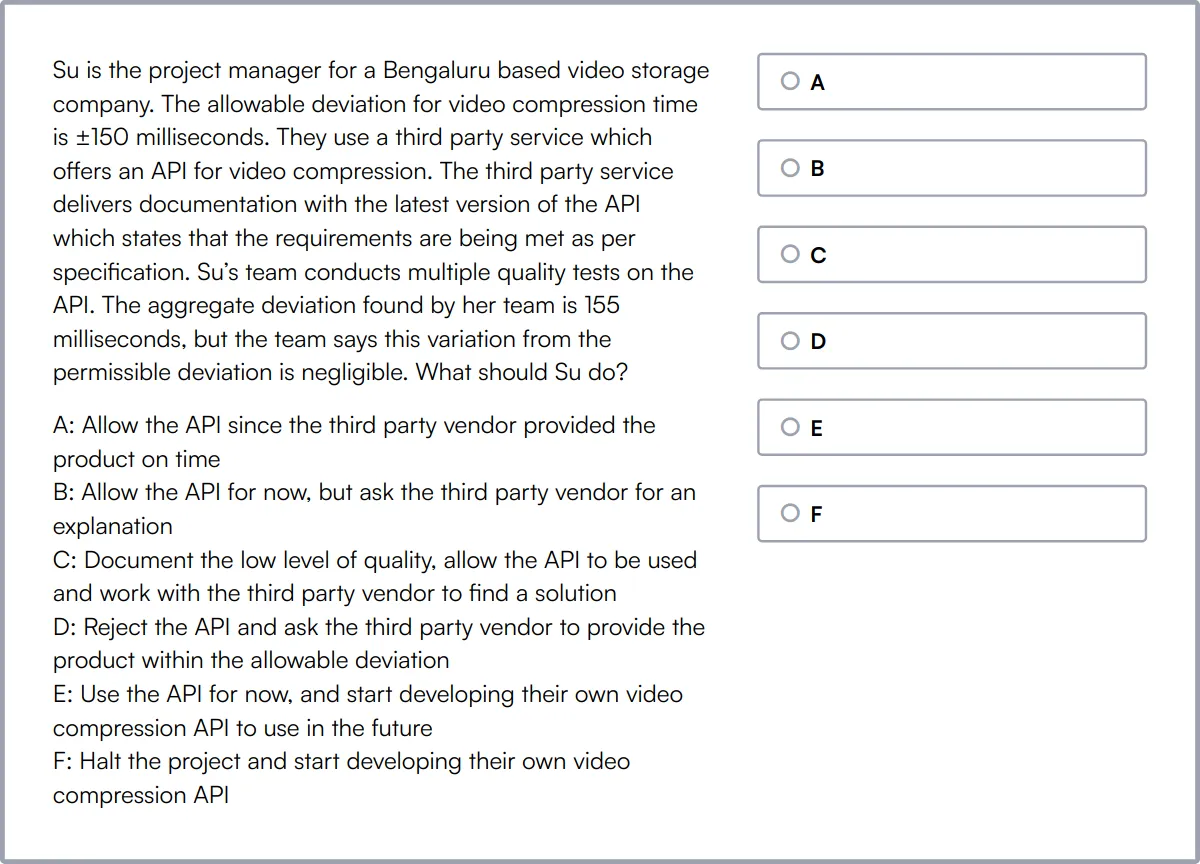
Data Analysis Test
Our Data Analysis Test assesses a candidate's ability to handle, modify, analyze, and interpret data using scenario-based questions.
The test evaluates skills in data modelling, data analysis, business analysis fundamentals, data interpretation, and SQL. Candidates are tested on their ability to analyze data to find possible outcomes, detect anomalies, and visualize data using charts and graphs.
Successful candidates demonstrate strong analytical skills and proficiency in popular data tools like Excel.

Communication Skills Test
Our Communication Skills Test evaluates candidates' communication skills, including verbal and written communication, active listening, and interpersonal skills.
The test covers communication skills, situational judgement, attention to detail, critical thinking, and verbal reasoning. Candidates are assessed on their ability to effectively communicate with customers, colleagues, and stakeholders in various professional scenarios.
High-scoring candidates demonstrate excellent verbal reasoning and critical thinking abilities, ensuring clear and effective communication in the workplace.
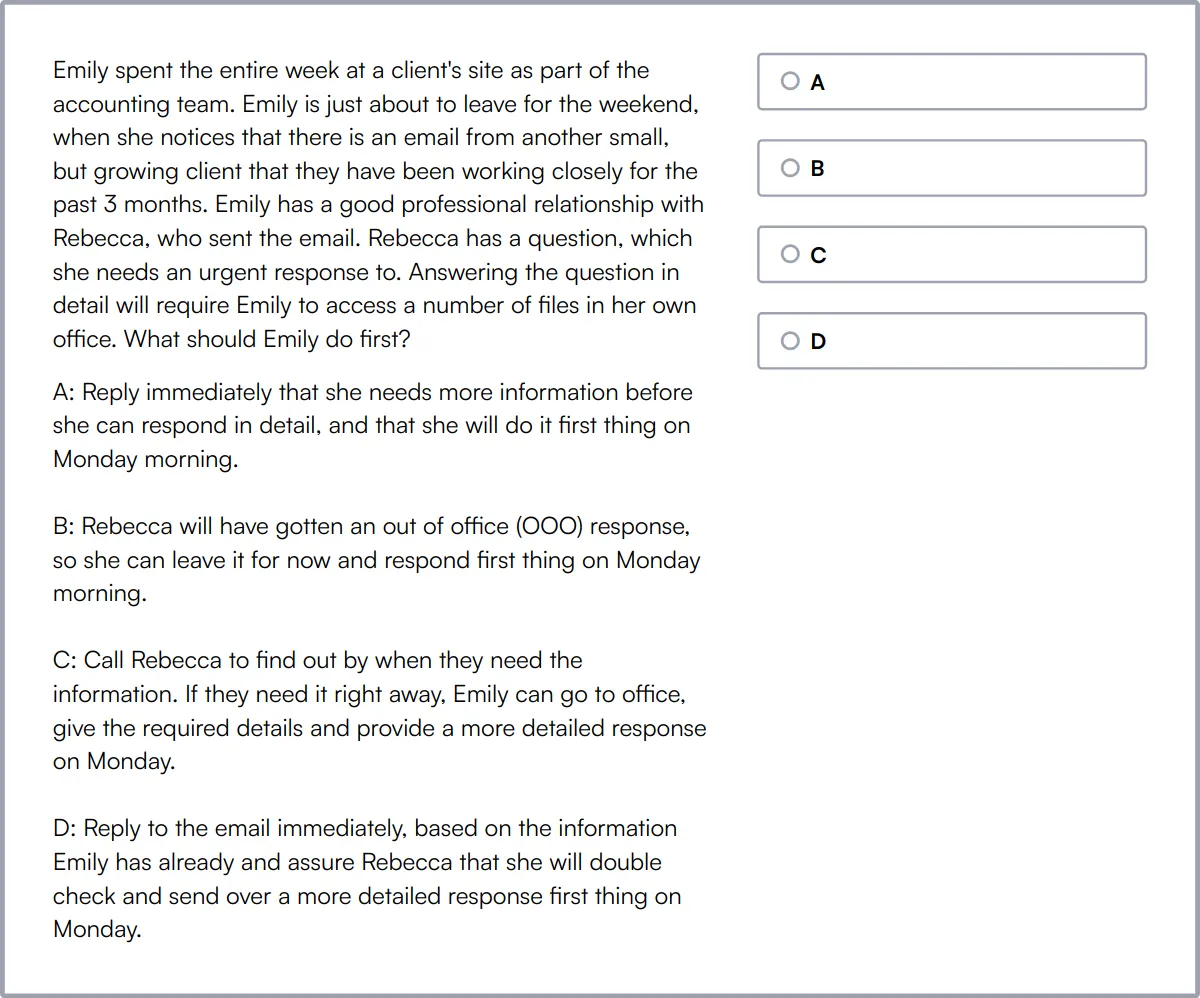
Problem Solving Test
Our Problem Solving Test evaluates a candidate's ability to understand instructions, analyze data, and respond to complex problems or situations.
The test assesses skills in abstract reasoning, critical thinking, deductive reasoning, inductive reasoning, pattern matching, and spatial reasoning. Candidates are required to navigate through various problem-solving scenarios.
Successful candidates demonstrate strong problem-solving skills, learning agility, and the ability to handle complex situations effectively.
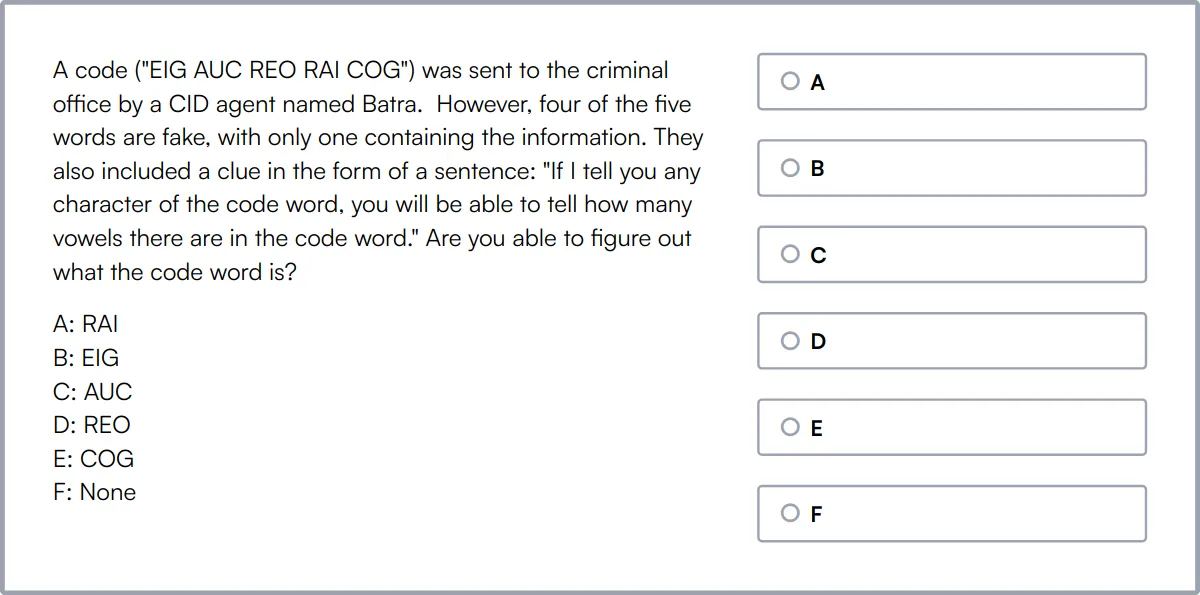
Administrative Assistant Test
Our Administrative Assistant Test is designed to evaluate a candidate's skills and aptitude for the role of an administrative assistant.
The test covers organizational skills, time management, communication skills, problem-solving skills, attention to detail, and following instructions. Candidates are assessed on their ability to handle specific situations that may arise in an administrative assistant role.
High-scoring candidates demonstrate proficiency in managing schedules, handling correspondence, and dealing with confidential information effectively.
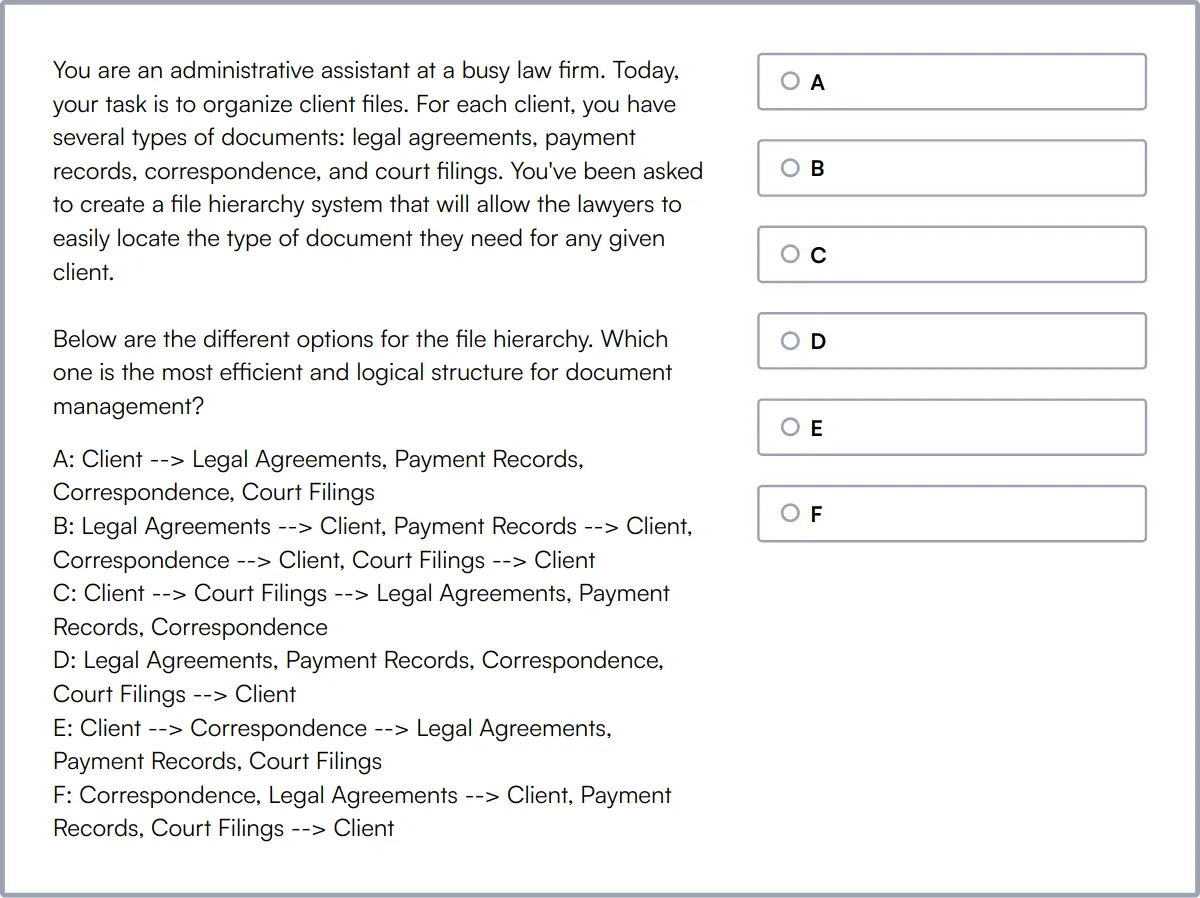
Summary: The 9 key Chief Of Staff skills and how to test for them
| Chief Of Staff skill | How to assess them |
|---|---|
| 1. Strategic Planning | Evaluate ability to develop long-term goals and actionable plans. |
| 2. Project Management | Assess competence in organizing, executing, and completing projects. |
| 3. Data Analysis | Check proficiency in interpreting and deriving insights from data. |
| 4. Communication | Observe clarity, effectiveness, and adaptability in verbal and written communication. |
| 5. Problem Solving | Test ability to identify, analyze, and resolve complex issues. |
| 6. Time Management | Review skills in prioritizing tasks and managing deadlines. |
| 7. Financial Acumen | Examine understanding of financial strategies and economic factors. |
| 8. Stakeholder Management | Assess ability to manage and satisfy stakeholder expectations. |
| 9. Organizational Skills | Evaluate efficiency in managing resources and organizing work. |
Administrative Assistant Test
Chief Of Staff skills FAQs
What are the key strategic planning skills needed for a Chief of Staff?
A Chief of Staff should be able to define long-term goals, align them with the organization's vision, and develop actionable plans to achieve these objectives. They should also be skilled in scenario planning and resource allocation.
How can you assess a candidate's project management capabilities for a Chief of Staff role?
Evaluate their experience with managing timelines, budgets, and teams. Look for a history of successful project completions. Asking for specific examples during interviews or checking references can provide insights into their project management skills.
What importance does data analysis hold for a Chief of Staff?
Data analysis is critical for making informed decisions and measuring the impact of strategic initiatives. A Chief of Staff should be able to interpret complex data sets and provide actionable insights.
Why is communication vital for a Chief of Staff?
Effective communication ensures that all team members and stakeholders are aligned with the organization's goals. It involves clear, concise information sharing and the ability to listen and adapt messages for different audiences.
How can problem-solving skills be evaluated when hiring a Chief of Staff?
During the interview, present hypothetical scenarios related to common challenges in the organization. Assess the candidate's ability to analyze situations, think critically, and propose practical solutions.
What role does financial acumen play in the effectiveness of a Chief of Staff?
Financial acumen allows a Chief of Staff to contribute to budget planning, cost analysis, and financial forecasting, which are integral for strategic decision-making and maintaining the fiscal health of the organization.
How does stakeholder management manifest in a Chief of Staff's daily responsibilities?
A Chief of Staff frequently interacts with internal and external stakeholders. They need to manage relationships, understand stakeholder needs, and negotiate to align diverse interests with the organization's goals.
What are some methods to assess adaptability in a Chief of Staff candidate?
Look for evidence of successfully managed past transitions or crises. Behavioral interview questions can also reveal how a candidate has adapted to significant changes or overcome obstacles in their previous roles.
Assess and hire the best Chief Of Staffs with Adaface
Assessing and finding the best Chief Of Staff is quick and easy when you use talent assessments. You can check out our product tour, sign up for our free plan to see talent assessments in action or view the demo here:

40 min skill tests.
No trick questions.
Accurate shortlisting.
We make it easy for you to find the best candidates in your pipeline with a 40 min skills test.
Try for freeRelated posts
Free resources



